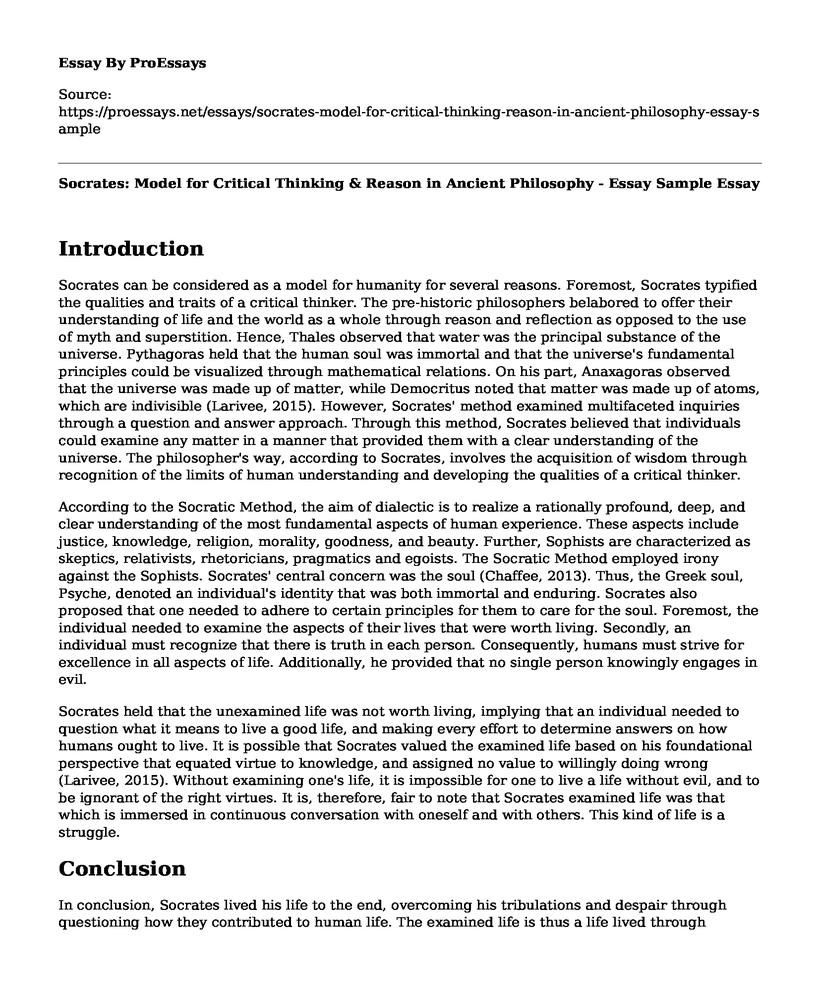Introduction
Socrates can be considered as a model for humanity for several reasons. Foremost, Socrates typified the qualities and traits of a critical thinker. The pre-historic philosophers belabored to offer their understanding of life and the world as a whole through reason and reflection as opposed to the use of myth and superstition. Hence, Thales observed that water was the principal substance of the universe. Pythagoras held that the human soul was immortal and that the universe's fundamental principles could be visualized through mathematical relations. On his part, Anaxagoras observed that the universe was made up of matter, while Democritus noted that matter was made up of atoms, which are indivisible (Larivee, 2015). However, Socrates' method examined multifaceted inquiries through a question and answer approach. Through this method, Socrates believed that individuals could examine any matter in a manner that provided them with a clear understanding of the universe. The philosopher's way, according to Socrates, involves the acquisition of wisdom through recognition of the limits of human understanding and developing the qualities of a critical thinker.
According to the Socratic Method, the aim of dialectic is to realize a rationally profound, deep, and clear understanding of the most fundamental aspects of human experience. These aspects include justice, knowledge, religion, morality, goodness, and beauty. Further, Sophists are characterized as skeptics, relativists, rhetoricians, pragmatics and egoists. The Socratic Method employed irony against the Sophists. Socrates' central concern was the soul (Chaffee, 2013). Thus, the Greek soul, Psyche, denoted an individual's identity that was both immortal and enduring. Socrates also proposed that one needed to adhere to certain principles for them to care for the soul. Foremost, the individual needed to examine the aspects of their lives that were worth living. Secondly, an individual must recognize that there is truth in each person. Consequently, humans must strive for excellence in all aspects of life. Additionally, he provided that no single person knowingly engages in evil.
Socrates held that the unexamined life was not worth living, implying that an individual needed to question what it means to live a good life, and making every effort to determine answers on how humans ought to live. It is possible that Socrates valued the examined life based on his foundational perspective that equated virtue to knowledge, and assigned no value to willingly doing wrong (Larivee, 2015). Without examining one's life, it is impossible for one to live a life without evil, and to be ignorant of the right virtues. It is, therefore, fair to note that Socrates examined life was that which is immersed in continuous conversation with oneself and with others. This kind of life is a struggle.
Conclusion
In conclusion, Socrates lived his life to the end, overcoming his tribulations and despair through questioning how they contributed to human life. The examined life is thus a life lived through questioning for what is good and desirable for human existence. It is a life that is continuously preoccupied with the search for truth and the presentation of the positive attributes of things. Through the examined life, one relies on proper instruction to realize self-control and to avoid being a victim of persuasion and pleasure. Socrates examined life entails the constant, structured examination of life's meaning both with the self and with others. Determining virtues and the fundamental truth should occupy the human mind so that they develop a developed perspective.
References
Larivee, A. (2015). An Unexamined Life is Not worth Living for Human Beings. Dialogos, (98), 11-25. Retrieved from https://revistas.upr.edu/index.php/dialogos/article/view/13175
Chaffee, J. (2013). The philosopher's way: A text with readings: thinking critically about profound ideas. Boston: Pearson Education.
Cite this page
Socrates: Model for Critical Thinking & Reason in Ancient Philosophy - Essay Sample. (2023, Feb 27). Retrieved from https://proessays.net/essays/socrates-model-for-critical-thinking-reason-in-ancient-philosophy-essay-sample
If you are the original author of this essay and no longer wish to have it published on the ProEssays website, please click below to request its removal:
- Mill, Kant and The Ethical Divid - Utilitarianism and Deontology
- Ethical Arguments About Marketing Essay Example
- Racial and Ethnic Inequality: A Major Challenge in the US - Essay Sample
- Essay Example on Mill's Argument on Happiness at the Root of Morality
- Essay Example on Determinism: Everything is Pre-Determined, But Reality?
- Moral Sensitivity: Recognizing Problems & Consequences - Free Essay Sample
- Code of Ethics and Political Perspectives - Essay Sample







